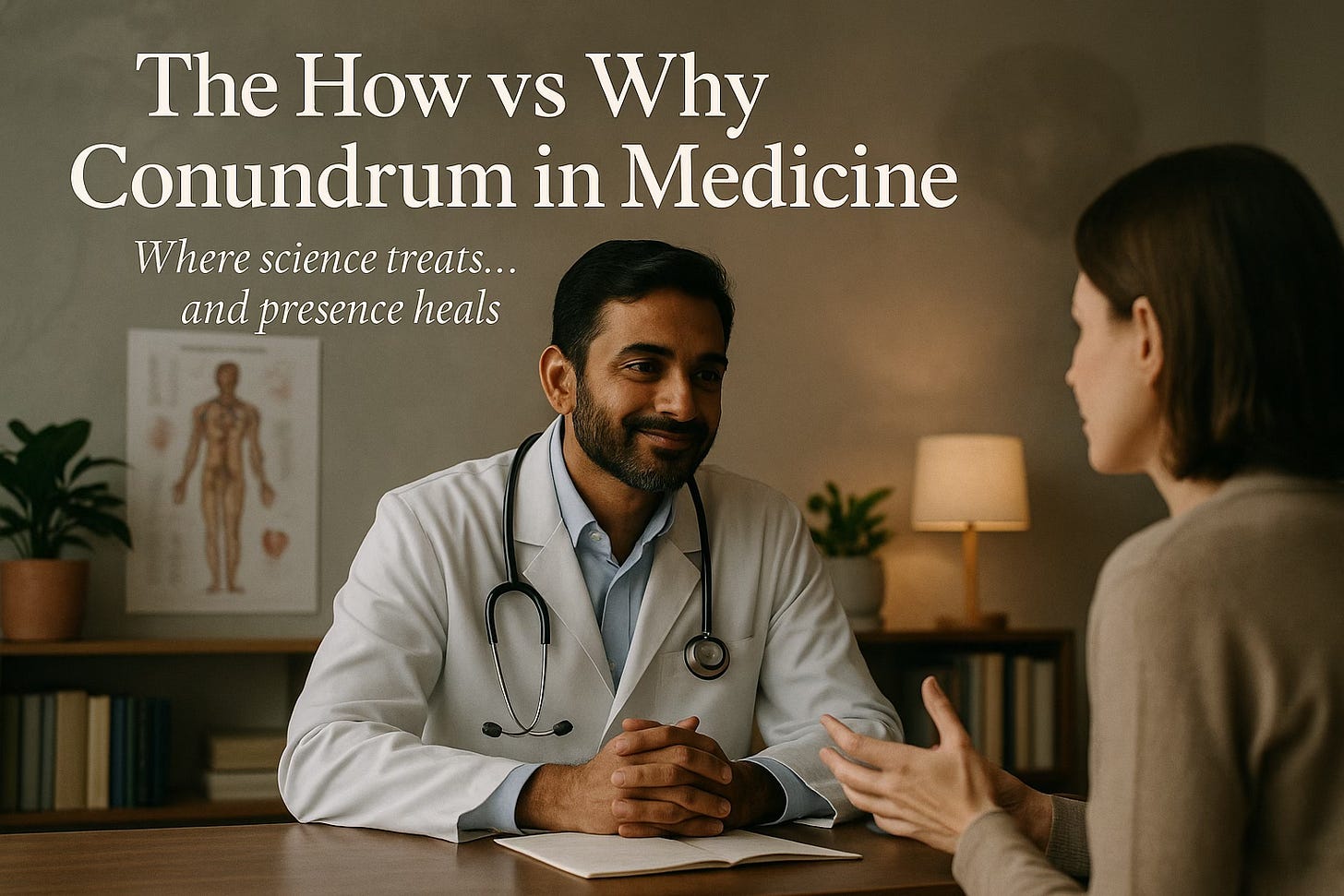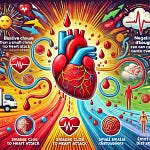There’s a subtle but profound conundrum in the world of medicine that we rarely talk about.
We’re trained to be masters of the "how"—
How does this disease develop?
How do we treat it?
How do we manage complications?
But increasingly, I find myself drawn to the "why"—
Why did this person, at this moment in their life, get this disease?
Why now? Why them?
Both are crucial. In fact, I believe the "how" and the "why" are the two eyes of modern medicine. One without the other leaves us partially blind. When we integrate both, we begin to see the whole person—not just the disease.
👁️🗨️ The "How" — The Engineer’s Lens
The “how” gives us the blueprint of the disease. It’s the pathogenesis, the lab values, the imaging, the mechanism behind the symptoms. It’s how we’ve built protocols and guidelines.
Take atherosclerosis, for instance:
The red clot ➝ white clot ➝ atheroma ➝ rupture ➝ critical block.
We’ve mapped this journey meticulously. That’s the brilliance of modern medicine.
🧭 The "Why" — The Philosopher’s Question
But what about the why?
Why do two people with the same lifestyle and risk factors have completely different clinical outcomes?
Why does a person in their thirties develop inflammatory myopathy from an Anti-SRP antibody, a disease with a prevalence of less than 1%?
That’s when the deeper layers emerge—layers that rarely show up on scans or labs.
A few questions I often sit with:
What chronic, unresolved emotional traumas does this person carry?
Has their stress become a silent background music their body no longer notices?
Has their nervous system forgotten what safety feels like?
The “why” takes us into the landscape of mind, memory, and meaning—territories not always explored in our medical training.
🧠 A Clinical Case That Stirred Me
Just today, we had a presentation on a case of acute necrotising inflammatory myopathy—a rare autoimmune condition. The science behind it was mind-blowing. Deep immunology, targeted antibodies, precise treatments.
And yet, the question that lingered was:
Why did this happen to him, now?
As I dug deeper, research led me to the 4 key risk factors commonly found in autoimmune diseases:
Childhood trauma (especially emotional neglect)
Chronic emotional repression
Sustained sympathetic overdrive (unchecked chronic stress)
Loss of restorative states like deep rest, safety, and connection
It hit me: We are so good at averting crises through powerful tools like immunosuppression and immunomodulators. But we’re still playing on the surface.
We’re managing the expression, but are we healing the origin?
💊 A Question of Balance: Medications vs Root Causes
Don’t get me wrong. I love the elegance of medicine—how we balance risk and benefit, especially in critical care. I’ve seen steroids save lives, and I’ve also seen the suffering from their long-term use. I admire how far immunomodulatory therapies have come.
But none of these are truly risk-free. Nor are they curative in the deepest sense.
What if we could complement them with something gentler—but possibly more profound?
What if we, as clinicians, learned to ask better questions—questions that help our patients feel safe enough to explore their internal landscapes?
🔐 The Key Lies in Safety + Skillful Inquiry
To access the “why,” two things must align:
The patient must feel safe—emotionally, psychologically, relationally.
We must learn to ask differently—with curiosity, not judgment; with compassion, not clinical detachment.
Sometimes the “why” is buried beneath shame or repressed memories. But if we, as healers, are willing to sit with our own discomfort, face our own emotional residues, and train ourselves in psychoneuroimmunology and trauma science, we may just find the courage and clarity to help others do the same.
🌿 The Future of Medicine Is Integrative, Insightful & Inside-Out
We are entering an era where the nervous system, immune system, endocrine system, and emotional memory are no longer studied in silos. The rise of psychoneuroimmunology and psychoneuroendocrinology is a testament to that.
And as we begin to apply these insights clinically, a whole new model of care emerges—not just reactive, but preventive, predictive, and participatory.
Not just disease-focused, but person-focused.
✨ A Drop in the Ocean
Like my mentor once said:
“Medicine is an ocean, and what we know is but a drop.”
I don’t want to know the whole ocean. But I want to dive deep into every drop I explore.
If that drop can reduce the suffering (not just the pain) of even one human being, then that’s a drop worth studying.
Pain is physiological.
Suffering is psychological.
And if we can reduce suffering—not just with pills but with presence, not just with treatment but with understanding—then medicine becomes not just a science, but a sacred art.
In pursuit of medicine that heals not just the body, but the being,
Dr. Krishna Bharath, MD
“The future of medicine isn’t just in better answers—but in braver questions.”














Share this post